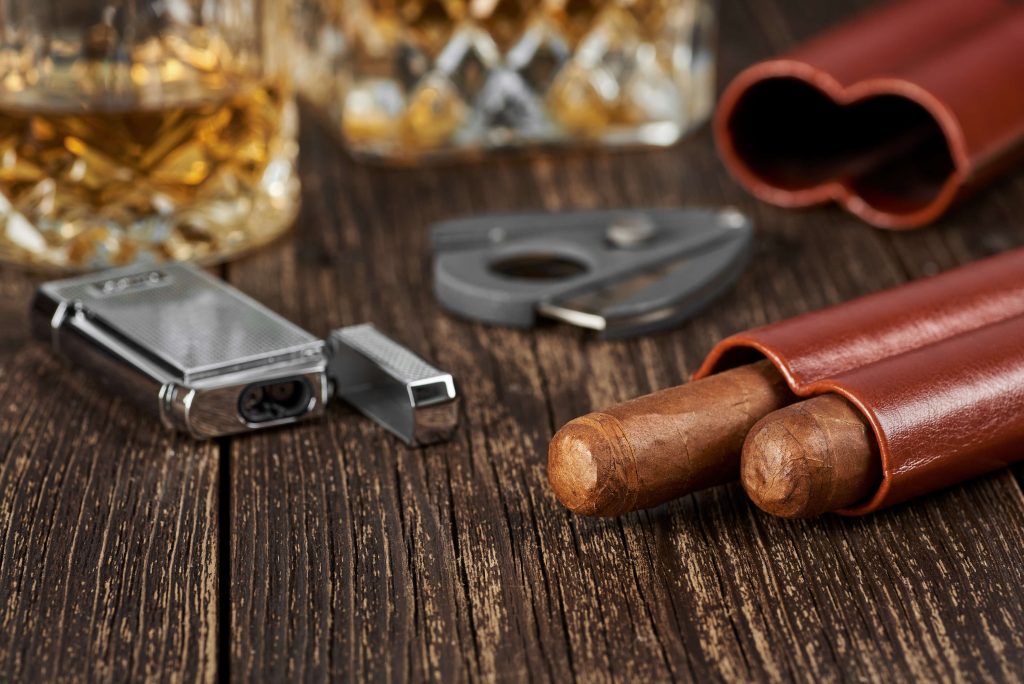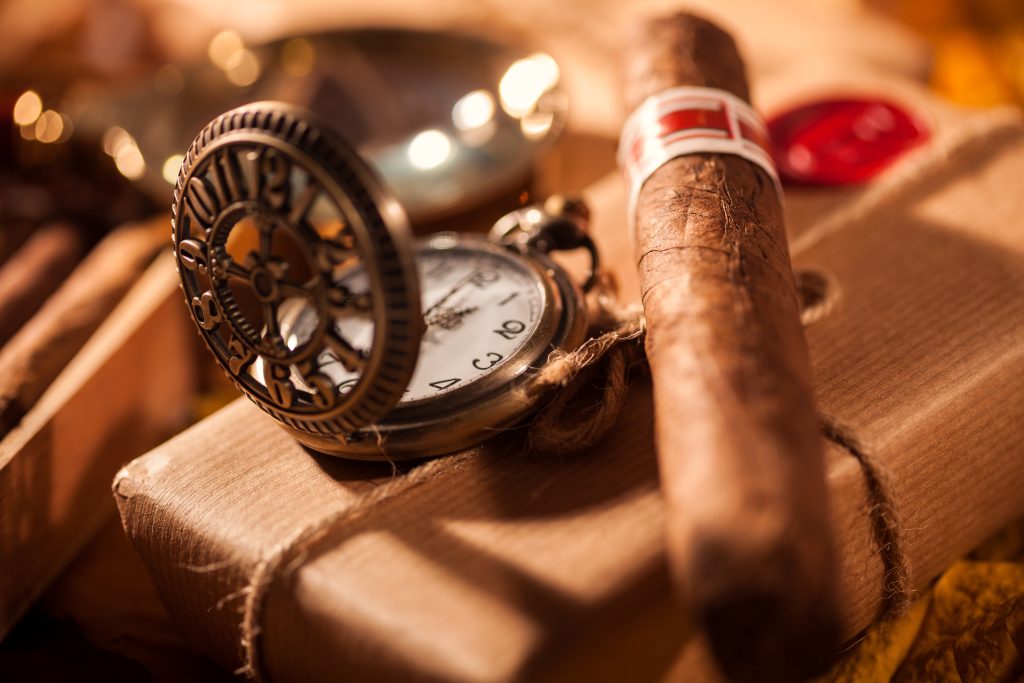For those who enjoy the art of smoking cigars, the experience can be a delightful and calming indulgence. However, it’s essential to acknowledge that some individuals may encounter cigar sickness, which can dampen the moment’s joy.
Cigar sickness, also called “smoker’s sickness” or “green sickness,” encompasses the unpleasant symptoms that particular cigar enthusiasts might face, including dizziness, nausea, and even vomiting.
These symptoms predominantly arise from the elevated levels of nicotine present in cigars. The good news is that several tips and tricks can aid in avoiding cigar sickness, enabling you to relish the delights of cigar smoking fully.
In this article, we’ll delve into these techniques and offer valuable insights on heightening your overall experience and overcoming cigar sickness.
- Choose the right cigar and lighter
- Smoke after a meal
- Take your time when smoking your cigar
- Mind your environment including ventilation
- Don’t inhale the smoke
- Store your cigars properly
- Choose lighter drinks
- Find the right time for smoking your cigar
- Manage how often you smoke a cigar
- Know your limits
Cigar Sickness Symptoms
A simple explanation lies at the root of feeling sick from cigars: an overload of nicotine in the body, prompting your system to purge the excess. This discomfort is often experienced when individuals mistakenly inhale or swallow cigar smoke as they would with a cigarette.
Remember, cigars are not cigarettes, so avoid smoking them the same way! In the following sections, we will explore the symptoms of cigar sickness and guide how to prevent it; if you forget some tips, fret not, as we’ve included remedies for next time to help you cope with the dreaded cigar sickness.
If you experience any of the symptoms below, you’re the unlucky victim of cigar sickness, or a nicotine overdose.
- Nausea
- Vomiting
- Headache
- Dizziness
- Lightheadedness
- Sweating
- Rapid heartbeat
- Chills
- Fatigue
While none of these symptoms poses an immediate life-threatening risk, taking them seriously is essential. If the discomfort persists after trying remedies or medications, it’s crucial to seek immediate medical attention. In such cases, ask someone to accompany you to the hospital, and be sure to bring the cigar you smoked with you.
Prolonged symptoms might show a possibility of pesticide poisoning, mainly linked to cheaper, machine-made cigars. Your well-being is of utmost importance, and seeking professional medical help when necessary can help ensure your safety and health.
1. Choose the Right Cigar and Lighter

Selecting the perfect cigar is an art that plays a pivotal role in preventing cigar sickness. Cigars come in a wide range of strengths, from mild to strong, each with varying nicotine levels. Opting for milder cigars is wise for those starting or with a lower nicotine tolerance.
Look for cigars labeled as “mild” or “medium” strength, as they contain lower nicotine. Steer clear of strong and full-bodied cigars initially, as they can overwhelm newcomers and potentially lead to a nicotine overload.
Handmade cigars are the way to go, as they are prepared with meticulous care and attention to detail. The aging process is vital to ensure that all pesticides and harmful chemicals are thoroughly eliminated from the leaves before they are selected and rolled into cigars.
Unfortunately, the aging process may be rushed for machine-made cigars, leading to leaves that aren’t adequately aged and might retain lingering pesticides. To avoid the risk of these additives exacerbating your symptoms, it’s best to steer clear of machine-made cigars and opt for the quality and care of handmade ones.
The chemicals used to make matches can contribute to your feeling sick. The same with butane lighters—keep your cigar out of the flame. Also, ensure you use quality, purified lighter fluid when refilling your lighter. Small measure, but they can make a huge difference!
2. Smoke After a Meal

A highly effective method to prevent cigar sickness is to indulge in your cigar after a hearty meal. Smoking on an empty stomach can intensify the effects of nicotine, resulting in lightheadedness and nausea.
Opting for a well-balanced meal can stabilize your blood sugar levels, reducing the impact of nicotine on your system. Additionally, keeping yourself hydrated during your smoke session by drinking water or a non-alcoholic beverage can further alleviate any potential discomfort.
While it’s true that snacking between meals is generally discouraged, there are times when smoking on an empty stomach becomes unavoidable. In such situations, there are smart snacking choices that can help mitigate the effects of nicotine and avoid an unpleasant experience.
Opt for nuts, dark chocolate, or candied ginger as a light snack before lighting up. These options can provide a slight sugar boost and help settle your stomach, lessening the chances of experiencing cigar sickness.
3. Take Your Time When Smoking Your Cigar

Savoring a cigar is akin to enjoying a fine wine or a delectable meal. Rushing through a cigar can lead to an overload of nicotine, resulting in cigar sickness. Instead, take your time to indulge in the incredible flavors and intoxicating aromas of the cigar.
Puff slowly and allow the smoke to linger in your mouth briefly before exhaling. Avoid inhaling the smoke, as this can lead to a more significant nicotine intake and increase the chances of feeling sick. Smoking too quickly and frequently will only result in an undesirable charred taste.
Nicotine has a delayed impact, so as more enters your system, additional amounts flow through your bloodstream. Enjoy your cigar leisurely, taking your time with each puff to manage this.
Should you feel the cigar’s strength becoming overpowering, pause and set it aside for a moment. Prioritizing your comfort and enjoyment is perfectly acceptable. Ginger tea or peppermint tea can help to settle nausea.
4. Smoke in Open Air or Ventilated Areas

The environment in which you choose to smoke can profoundly influence your experience. Steer clear of smoking in cramped spaces lacking proper ventilation, as this can cause the accumulation of smoke, intensifying the impact of nicotine.
Instead, opt for open-air locations or well-ventilated smoking lounges to minimize the risk of experiencing any unpleasant sensations. Fresh air is important to avoid a mild form of nicotine poisoning.
5. Don’t Inhale the Smoke
When enjoying a cigar, you must follow a golden rule: never inhale. Unlike cigarettes, cigars are a different animal. Cigars are carefully crafted works of art using pure, premium long-filler tobaccos with no additives or chemicals.
Because of their pure tobacco composition, cigars pack more nicotine than cigarettes. Inhaling cigar smoke can lead to coughing and a rapid influx of nicotine into your bloodstream.
When taking a puff, draw the smoke into your mouth, savoring the flavors, and gently release it after a few seconds. But remember, do not suck it deep into your lungs. By following these guidelines, you can fully appreciate the unique pleasures of cigar smoking without discomfort.
6. Store Your Cigars Properly

Proper cigar storage plays a crucial role in maintaining the quality of cigars and reducing the potential health risks associated with them. Cigars are a product of meticulous craftsmanship, with their flavors and aromas carefully developed over time. However, these qualities can be protected only if cigars are stored correctly.
Cigars are best kept in a humidified environment, typically within a humidor. Humidors are designed to maintain a specific level of humidity, usually around 70%, which helps preserve the cigars’ essential oils and prevents them from drying out. When cigars dry out, they can become brittle and lose their flavor and aroma. More importantly, improperly stored cigars can also produce harsher smoke, potentially increasing the risk of inhaling harmful chemicals and irritants.
When cigars are not stored in a controlled environment, they can absorb odors and flavors from their surroundings. This means that if cigars are stored in places with strong odors, like a kitchen or near perfumes, they can acquire undesirable tastes that detract from the overall smoking experience. Properly stored cigars, on the other hand, maintain their purity of flavor and aroma.
7. Choose Lighter Drinks

If you choose to drink with your cigar, choose lighter or non-alcoholic options. Yes, we know whiskey and cigars are the ultimate luxury combination…
Here are some specific beverage suggestions:
- Water: The classic choice for pairing with cigars. Water helps to cleanse the palate and brings out the natural flavors of the cigar.
- Soda: A light and refreshing option that can help cut the cigar’s richness.
- Coffee: A flavorful and aromatic choice that can complement the bolder flavors of some cigars. You can read this article on cigar and coffee pairing.
- Non-alcoholic cocktails: There are many non-alcoholic cocktails (also known as mocktails) that you can pair with cigars. Some popular options include the Shirley Temple, the Virgin Mary, and the Mojito.
- Non-alcoholic spirits: These are designed to bring the same taste as their alcoholic counterparts without the alcohol.
- Ginger tea and peppermint tea can help when you start to feel ill and alleviate cigar sickness.
By choosing the right beverage, you can enhance the enjoyment of your cigar without overwhelming your senses.
8. Find the Right Time for Smoking Cigars

Selecting the perfect moment for your cigar session can significantly influence how you’ll feel afterward. It’s crucial to avoid smoking when you’re tired, stressed, or not in the best of health. These factors can intensify the effects of nicotine and exacerbate any potential symptoms of cigar sickness.
Instead, opt for a time when you’re feeling relaxed and in good health to relish the pleasures of your cigar fully. By doing so, you’ll maximize your enjoyment and minimize any adverse effects, allowing the true essence of the cigar to shine through.
9. Manage How Often You Smoke
Although smoking can be a delightful and leisurely pursuit, exercising moderation is essential to avoid cigar sickness. Smoking too frequently can accumulate nicotine in your system, heightening the risk of feeling unwell.
Limiting your smoking sessions to occasional treats is wise, allowing you to savor and appreciate each experience fully. Smoking multiple cigars in a sitting is not advisable. By indulging in cigars with a balanced approach, you can relish the pleasures they offer without subjecting yourself to the discomfort of cigar sickness.
Remember, the quality of the experience counts, not the quantity of cigars smoked.
10. Know Your Limits
Recognizing your personal nicotine tolerance is of utmost importance. Each individual possesses a distinct capacity for nicotine, making it essential to know your limits. Suppose you start to experience lightheadedness or nausea while smoking; putting the cigar down and taking in some fresh air is crucial.
Your well-being always takes precedence, and listening to your body shows self-care and wisdom.
Prioritizing your health and comfort will ensure that your cigar-smoking experiences remain enjoyable and satisfying in the long run.
Conclusion
Smoking cigars can be a delightful and relaxing experience in moderation and with proper care. You can avoid the unpleasant symptoms of cigar sickness by choosing the right cigar, smoking after a meal, puffing slowly, and being mindful of your environment. Remember not to inhale the smoke, select lighter drinks, and find the perfect time to enjoy your cigars. Understanding your limits and smoking in moderation will allow you to fully savor the rich flavors and aromas each cigar offers, creating a more enjoyable and satisfying cigar-smoking journey.
Happy smoking!

